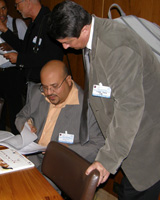 |
Dr. Tudor Vlad with Dr. Mohamed Ismail of Ajman University in the United Arab Emirates. |
Cox Center Assistant Director Reviews Changes In Romanian Journalism and Journalism Education
Journalism and journalism education have changed dramatically in Romania since the fall of communism in 1989, and both journalism and journalism education are more varied today than they were in 1989. Yet problems remain in both the education and practice of journalists in the country today.
This was one of the conclusions offered by Dr. Tudor Vlad, assistant director of the James M. Cox Jr. Center of International Mass Communication Training and Research, to a group of international researchers meeting in Paris in late July.
The media market in Romania suffers from what Dr. Vlad called “hypercompetition,” with too many media outlets trying to compete for audiences and advertising revenue, often by resorting to sensationalism, according to Dr. Vlad.
In addition, many newly created, private journalism programs are staffed by underqualified instructors offering a curriculum that does not provide the needed instruction in the theory and practice of journalism.
“Some programs are regarded as institutions that - in exchange for fees, light attendance and a minimal intellectual effort – will provide an individual with a degree that will have minor relevance to the job market,” Dr. Vlad said.
Dr. Vlad’s comments were made in a session of the Professional Education Section of the International Association for Media and Communication Research Conference held from July 22-25 at UNESCO headquarters in Paris. Other presenters at the session focused on journalism education in other countries, such as Egypt, Oman, Brazil and Kuwait. The presentations will become part of a book on journalism education.
Dr. Vlad also presented a second paper in a poster session at the conference based on research conducted in the Cox Center evaluating a post-employment training program for journalists operated by the Knight Chair in Health and Medical Journalism at the University of Georgia. That research provided evidence that the health training program resulted in increased coverage of key health topics by journalists who participated.
Dr. Lee B. Becker, director of the Cox Center, was a co-author of the report on the training program evaluation. The Cox Center and the Knight Chair in Health and Medical Journalism are located in the Grady College of Journalism and Mass Communication at the University of Georgia.
Dr. Becker also was a panelist in a special session of the Professional Education Section at the conference “Celebrating 50 Years of Theories and Practices in Professional Education for Journalists around the World.” The IAMCR conference was held in Paris on the 50th anniversary of the founding of the organization in that city.
At the commemorative session, Dr. Becker drew on data from the Center’s Annual Surveys of Journalism & Mass Communication to identify key trends in enrollment levels in journalism and mass communication programs in U.S. universities and patterns of employment of graduates of these programs.
Approximately 800 media researchers from around the world attended the conference.
- “Few Educators, Many Media and Journalism Programs: Journalism and Mass Communication Education in Romania after the Fall of Communism,” presented by Dr. Vlad.
- “The Impact of Post-Employment Journalism Training On Health and Medical Story Ideation,” presented by Dr. Becker and Dr. Vlad. at the poster session.
- “Journalism Education in the United States,” distributed by Dr. Becker at the commemorative panel.

